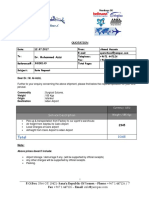0% found this document useful (0 votes)
135 views2 pagesAutomation Testing 2025
Automation testing is the use of software tools to execute test cases automatically, enhancing efficiency and accuracy in software testing. It offers benefits such as faster execution, cost-effectiveness, and improved test coverage, while encompassing various types like unit, functional, and performance testing. Despite challenges like high initial investment and maintenance needs, the future of automation testing looks promising with advancements in AI, cloud-based solutions, and scriptless automation.
Uploaded by
bhaskarCopyright
© © All Rights Reserved
We take content rights seriously. If you suspect this is your content, claim it here.
Available Formats
Download as DOCX, PDF, TXT or read online on Scribd
0% found this document useful (0 votes)
135 views2 pagesAutomation Testing 2025
Automation testing is the use of software tools to execute test cases automatically, enhancing efficiency and accuracy in software testing. It offers benefits such as faster execution, cost-effectiveness, and improved test coverage, while encompassing various types like unit, functional, and performance testing. Despite challenges like high initial investment and maintenance needs, the future of automation testing looks promising with advancements in AI, cloud-based solutions, and scriptless automation.
Uploaded by
bhaskarCopyright
© © All Rights Reserved
We take content rights seriously. If you suspect this is your content, claim it here.
Available Formats
Download as DOCX, PDF, TXT or read online on Scribd
/ 2



























































































